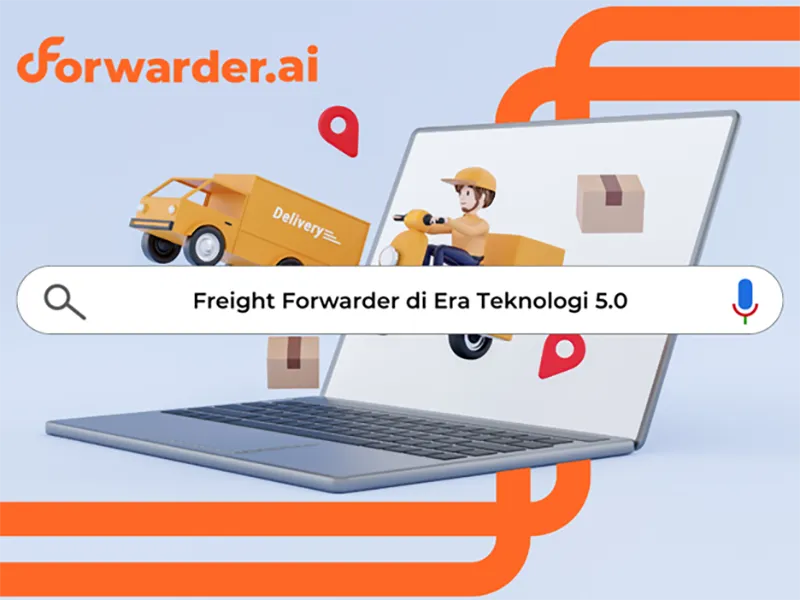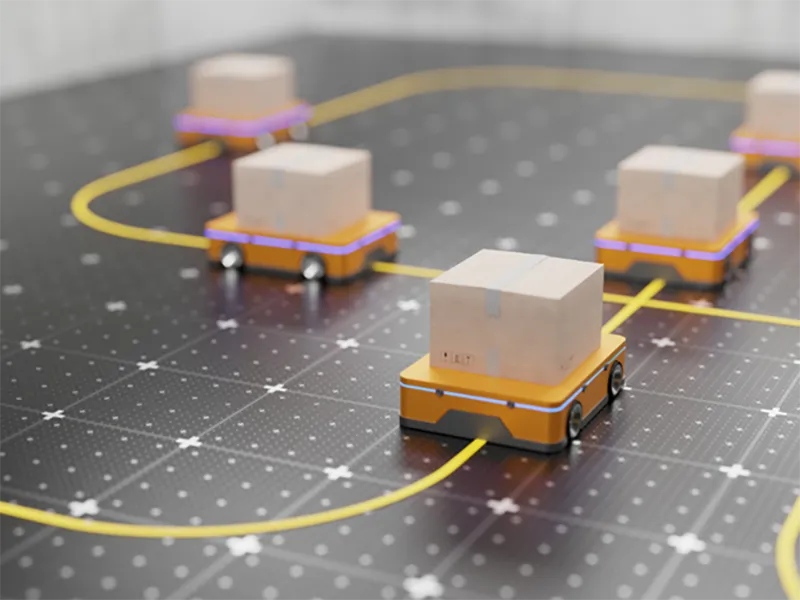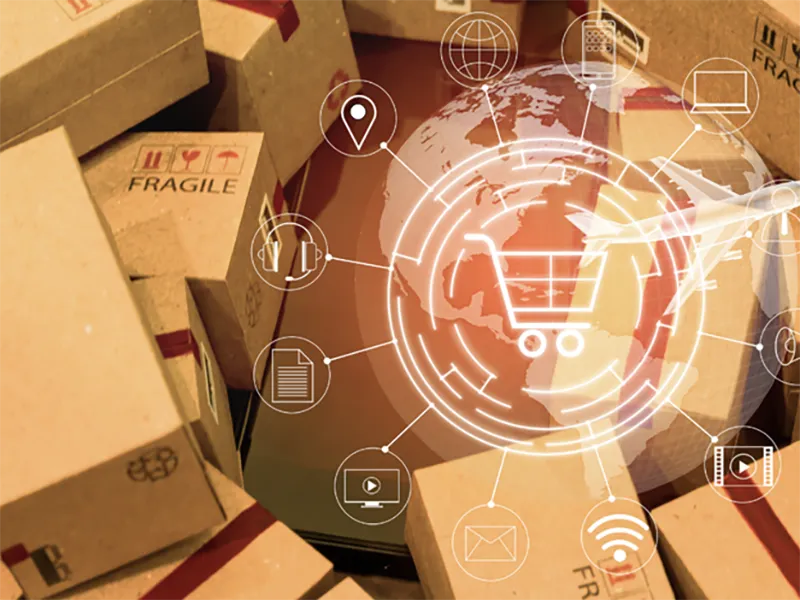
The era of Technology 5.0 in the logistics sector with freight forwarders playing an important role in improving operational efficiency.
The era of Technology 5.0 has brought major changes in digital transformation in many industries, including the logistics sector. Therefore, it is important that we remain competitive and continue to innovate as logistics plays a vital role in a country's economic growth.
In the era of 5.0. Today, technology plays a big role in the development of logistics. This is done by utilizing advanced technologies such as AI, machine learning, blockchain, and IoT to optimize the process of transporting and delivering goods. With these technological innovations, freight forwarders are able to manage all logistics processes such as; how to process packing goods, tracking packages, and shipping around the world, thereby increasing the efficiency and reliability of logistics services.
The impact of technology on logistics efficiency is significant. For example, AI and machine learning can be used to facilitate booking transaction recommendations and optimize delivery routes, which reduces operational time and costs. Meanwhile, blockchain provides transparency and security, ensuring that every step in the delivery process can be tracked and verified. IoT enables real-time monitoring of the condition of goods during delivery, reducing the risk of damage and loss.
With the adoption of these technologies, freight forwarders not only improve operational efficiency but also increase customer satisfaction. This more integrated and automated system enables faster and more accurate decision-making, reduces human error, and increases responsiveness to changing market needs. As technological developments continue, the role of freight forwarders as the link between technology and logistics will become increasingly important in ensuring the smoothness and sustainability of global supply chains.
The integration of artificial intelligence (AI) and machine learning in logistics operations allows freight forwarders to improve efficiency and accuracy in supply chain management. AI helps in analyzing big data to facilitate booking recommendations, optimize delivery routes, and reduce delivery time. For example, DHL has implemented AI in its operations to increase delivery efficiency by 20% and reduce operational costs by 15%. This technology gives logistics companies a competitive advantage, enabling them to provide faster and more reliable services to customers.
The application of AI for freight forwarding optimization is one of the most effective ways to maximize operational efficiency. Using machine learning algorithms, AI can identify patterns in shipment data that may not be visible to humans. This includes optimizing delivery routes by considering various factors such as traffic conditions, weather, and desired delivery time. Thus, AI not only helps reduce delivery time and costs, but also improves reliability and customer satisfaction by providing more accurate estimated arrival times.
Read more : Advantages of Digital Freight Forwarders: Easy Freight Forwarding Solutions
In addition, AI also plays an important role in risk management and decision-making. By analyzing historical data and market trends, AI can predict potential problems in the supply chain and provide recommendations to address them before they occur. This helps freight forwarders to be more proactive in managing their operations, reducing delays and minimizing disruptions. As AI and machine learning technologies continue to evolve, this integration will be increasingly important in ensuring sustainability and competitive advantage in the logistics industry.
The adoption of blockchain technology brings transparency and security in logistics transactions. Blockchain enables immutable records, so every stage in the supply chain can be tracked easily. IBM and Maersk have developed the TradeLens platform that uses blockchain to facilitate more efficient and transparent international trade. With blockchain, all parties in the supply chain have equal access to valid and secure data, reducing the risk of fraud and human error, and increasing trust between business partners.
The Internet of Things (IoT) also plays an important role in logistics transformation. IoT sensors enable real-time tracking of goods conditions during shipment, such as temperature, humidity, and location. With this information, freight forwarders can ensure the quality of goods is maintained and address logistics issues more quickly. According to a McKinsey report, the use of IoT in logistics can increase productivity by 15% and reduce freight losses by 25%. These advantages help logistics companies optimize their operations and provide more reliable services to customers.

Blockchain and IoT in Freight Forwarding.
The integration of blockchain and IoT creates a powerful synergy in the logistics industry, bringing significant benefits in terms of efficiency and security. With blockchain, data from IoT sensors can be stored securely and transparently, enabling better monitoring and easier auditing. The combination of these technologies not only improves visibility and control in the supply chain, but also enables faster responses to changes and issues that may occur. Thus, the adoption of blockchain and IoT is key in creating a smarter, more efficient, and highly competitive supply chain.
Technological advancements in logistics not only improve efficiency and transparency, but also give businesses the power to make more informed decisions. Data-driven decision making enables companies to optimize their supply chains and provide a better customer experience. By utilizing big data and advanced analytics, companies can identify previously unseen trends, patterns, and opportunities, which in turn improves the speed and accuracy of decision-making.
For example, Amazon uses data analytics and AI to manage inventory and predict product demand, which allows them to quickly and accurately deliver goods to customers. Through comprehensive data analysis, Amazon can determine which products need to be stored in a particular distribution center, thereby reducing delivery time and logistics costs. In addition, data-driven decision making helps Amazon manage risks, such as anticipating demand spikes during the holiday season or handling supply chain disruptions more efficiently.
Read more : Definition of Digital Freight Forwarding Services
With data-driven decision making, logistics companies can improve their overall operational performance. The use of dashboards and data visualization allows managers to monitor performance in real time and make necessary adjustments quickly. In addition, predictive analysis helps in planning long-term strategies and managing resources more effectively. As technology continues to evolve, data-driven decision-making will increasingly become a key element in creating a responsive, efficient and competitive supply chain in the global marketplace.
As the logistics industry evolves, the expertise and adaptability of freight forwarders will be key in dealing with the complexities of the 5.0 Technology Era. This era is characterized by the integration of advanced technologies such as AI, IoT, blockchain, and robotics, which are changing the way companies operate and compete. Freight forwarders that can embrace digital solutions and drive a culture of innovation will play a vital role in shaping the future of the logistics landscape. They must be able to adopt new technologies quickly and efficiently to stay relevant and competitive.
Challenges faced in the Age of Technology 5.0 include the speed of technological change, the need for higher digital skills, as well as complex system integration. In addition, companies must manage large amounts of data and ensure strict cyber security. However, behind these challenges, there are great opportunities to improve operational efficiency and create more value for customers. For example, UPS has invested more than $1 billion in logistics technology to improve operational efficiency and strengthen their position in the global market. These investments include the use of AI for route optimization, robotics for warehouse automation, and blockchain to improve supply chain transparency.

Digital delivery systems in the Technology Era 5.0.
By embracing new technologies, freight forwarders can speed up logistics processes, reduce costs, and improve delivery accuracy. They can also offer more personalized and responsive services to customers through data analysis and demand prediction. In addition, technological innovations allow companies to adapt more quickly to changing markets and customer needs. Therefore, in the Age of Technology 5.0, the ability to innovate and adapt quickly is the key to success for freight forwarders in building and maintaining a competitive advantage in the logistics industry.
By continuously innovating and adapting to the latest technology, forwarder.ai is ready to help you stay competitive to meet the shipping needs in this digital era. We come with forsis (Forwarder Scalable Intelligence System), an AI-powered transportation management system that streamlines your operations from booking to vehicle control, real-time monitoring, and other checks all in one platform.
There is also fordex (Forwarder Data Exchange) that integrates forwarder.ai's API into your system to make it easy to ship any goods. The fordex integration process is straightforward, from business registration and digital contract execution with guaranteed data security. In order to integrate technology with better logistics operations, we are ready to show you that forwarder.ai is a vital part of the freight forwarder supply chain that will continue to grow into a freight forwarder leader in Indonesia.
Nikmati voucher hingga 200K untuk pengiriman pertamamu. Langsung berlaku dan otomatis terpotong saat checkout.
Dapatkan Diskon!